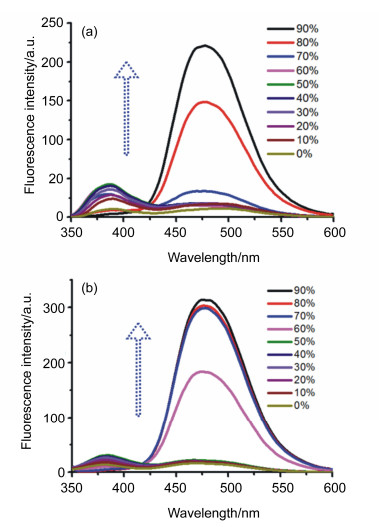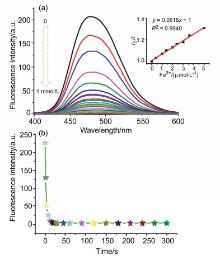有机化学 ›› 2019, Vol. 39 ›› Issue (11): 3250-3257.DOI: 10.6023/cjoc201904078 上一篇 下一篇
所属专题: 荧光探针-生物传感合辑; 有机超分子化学合辑
研究论文
何玉倩a, 赵冰a*( ), 阚伟a*(
), 阚伟a*( ), 王丽艳a, 宋波a, 殷广明a, 毕野a, 陈书文b*(
), 王丽艳a, 宋波a, 殷广明a, 毕野a, 陈书文b*( )
)
收稿日期:2019-04-30
发布日期:2019-06-19
通讯作者:
赵冰,阚伟,陈书文
E-mail:zhao_submit@aliyun.com;kan_submit@aliyun.com;anshancsw@126.com
基金资助:
He Yuqiana, Zhao Binga*( ), Kan Weia*(
), Kan Weia*( ), Wang Liyana, Song Boa, Yin Guangminga, Bi Yea, Chen Shuwenb*(
), Wang Liyana, Song Boa, Yin Guangminga, Bi Yea, Chen Shuwenb*( )
)
Received:2019-04-30
Published:2019-06-19
Contact:
Zhao Bing,Kan Wei,Chen Shuwen
E-mail:zhao_submit@aliyun.com;kan_submit@aliyun.com;anshancsw@126.com
Supported by:文章分享

设计合成具有激发态分子内质子转移(ESIPT)和聚集诱导发光(AIE)特征的酚羟基菲并咪唑Fe3+荧光探针PIP-o-OH,对其结构进行了表征和确认,并通过单晶结构确认了探针PIP-o-OH中的O-H与咪唑N的分子内氢键.紫外和荧光光谱分析表明,探针PIP-o-OH与Fe3+形成络合物后实现Fe3+的选择性识别,并通过质谱和离散傅立叶变换(DFT)计算确定了探针PIP-o-OH与Fe3+的配位方式.探针PIP-o-OH与Fe3+络合前后的荧光变化成功应用于HeLa细胞和实际水样中Fe3+的检测.
何玉倩, 赵冰, 阚伟, 王丽艳, 宋波, 殷广明, 毕野, 陈书文. 基于激发态分子内质子转移(ESIPT)和聚集诱导发光(AIE)活性的菲并咪唑Fe3+荧光探针及细胞成像研究[J]. 有机化学, 2019, 39(11): 3250-3257.
He Yuqian, Zhao Bing, Kan Wei, Wang Liyan, Song Bo, Yin Guangming, Bi Ye, Chen Shuwen. An Excited-State Intramolecular Proton Transfer (ESIPT) Plus Ag-gregation Induced Emission (AIE) Phenanthro[9, 10-d]imidazole-Based Fluorescence Probe for Detection of Fe3+ in Living Cells[J]. Chinese Journal of Organic Chemistry, 2019, 39(11): 3250-3257.










| 水样 | c(Fe3+)/(μmol?L-1) | Recovery/% | RSD/% | |
| 加入值 | 测定值 | |||
| 自来水 | 1 | 1.03 | 103.0 | 1 |
| 3 | 2.86 | 95.3 | 0.32 | |
| 5 | 4.93 | 98.6 | 0.65 | |
| 瓶装水 | 1 | 0.95 | 95.0 | 1.12 |
| 3 | 2.95 | 98.3 | 0.52 | |
| 5 | 4.89 | 97.8 | 0.23 | |
| 水样 | c(Fe3+)/(μmol?L-1) | Recovery/% | RSD/% | |
| 加入值 | 测定值 | |||
| 自来水 | 1 | 1.03 | 103.0 | 1 |
| 3 | 2.86 | 95.3 | 0.32 | |
| 5 | 4.93 | 98.6 | 0.65 | |
| 瓶装水 | 1 | 0.95 | 95.0 | 1.12 |
| 3 | 2.95 | 98.3 | 0.52 | |
| 5 | 4.89 | 97.8 | 0.23 | |
| [1] |
Liu R. J. Zeng J. Chin. J. Org. Chem. 2017 37 3274.
doi: 10.6023/cjoc201706037 |
|
刘 瑞姣 曾 竟 有机化学 2017 37 3274.
doi: 10.6023/cjoc201706037 |
|
| [2] |
Yang M. P. Su N. Li Y. X. Wang L. Ma L. F. Zhang Y. Li J. Yang B. Q. Kang L. L. Chin. J. Org. Chem. 2018 38 636.
doi: 10.6023/cjoc201709017 |
|
杨 美盼 苏 娜 李 玉香 王 莉 马 利锋 张 媛 李 靖 杨 秉勤 康 龙丽 有机化学 2018 38 636.
doi: 10.6023/cjoc201709017 |
|
| [3] |
Carter K. P. Young A. M. Palmer A. E. Chem. Rev. 2014 114 4564.
doi: 10.1021/cr400546e |
| [4] |
Chung P. K. Liu S. R. Wang H. F. Wu S. P. J. Fluoresc. 2013 23 1139.
doi: 10.1007/s10895-013-1242-6 |
| [5] |
Lee M. H. Kim J. S. Sessler J. L. Chem. Soc. Rev. 2015 44 4185.
doi: 10.1039/C4CS00280F |
| [6] |
Wang Q. Q. Zhou L. Y. Qiu L. P. Lu D. Q. Wu Y. X. Zhang X. B. Analyst 2015 140 5563.
doi: 10.1039/C5AN00683J |
| [7] |
Barman S. Mukhopadhyay S. K. Gangopadhyay M. Biswas S. Dey S. Singh N. D. P. J. Mater. Chem. B 2015 3 3490.
doi: 10.1039/C4TB02081B |
| [8] |
Maity D. Kumar V. Govindaraju T. Org. Lett. 2012 14 6008.
doi: 10.1021/ol302904c |
| [9] |
Yang C. Y. Chen Y. Wu K. Wei T. Wang J. L. Zhang S. S. Han Y. F. Anal. Methods 2015 7 3327.
doi: 10.1039/C5AY00224A |
| [10] |
Wang H. Shi D. L. Li J. Tang H. Y. Guo Y. Sens. Actuators, B 2018 256 600.
doi: 10.1016/j.snb.2017.10.124 |
| [11] |
Shen Y. M. Zhang X. Y. Zhang C. X. Zhang Y. Y. Jin J. L. Li H. T. Spectrochim. Acta, Part A 2018 191 427.
doi: 10.1016/j.saa.2017.09.069 |
| [12] |
Hu J. Cheng K. Wu Q. Ding D. S. Li C. G. Li Z. Mater. Chem. Front. 2018 2 1201.
doi: 10.1039/C8QM00107C |
| [13] |
Tian M. G. Sun J. Tang Y. H. Dong B. L. Lin W. Y. Anal. Chem. 2018 90 998.
doi: 10.1021/acs.analchem.7b04252 |
| [14] |
Feng L. Liu Z. M. Hou J. Lv X. Ning J. Ge G. B. Cui J. N. Yang L. Biosens. Bioelectron. 2015 65 9.
doi: 10.1016/j.bios.2014.10.002 |
| [15] | Hu Q. Zeng H. F. Yu C. M. Wu S. Z. Sens. Actuators, B 2015 220 72. |
| [16] |
Feng W. P. Wang Y. C. Chen S. Z. Wang C. Wang S. X. Li S. H. Li H. Y. Zhou G. Q. Zhang J. C. Dyes Pigm. 2016 131 145.
doi: 10.1016/j.dyepig.2016.03.019 |
| [17] |
Shvadchak V. V. Klymchenko A. S. De Rocquigny H. Mely Y. Nucleic Acids Res. 2009 37 e25.
doi: 10.1093/nar/gkn1083 |
| [18] | Luo J. D. Xie Z. L. Lam J. W. Y. Chen L. Chen H. Y. Qiu C. F. Kwok H. S. Zhan X. W. Liu Y. Q. Zhu D. B. Tang B. Z. Chem. Commun. 2001 1740 1740. |
| [19] |
Kwok R. T. K. Leung C. W. T. Tang B. Z. Chem. Soc. Rev. 2015 44 4228.
doi: 10.1039/C4CS00325J |
| [20] |
Xia Q. Chen Z. K. Zhang Z. D. Liu R.Y. Chin. J. Org. Chem. 2018 38 2700.
doi: 10.6023/cjoc201803029 |
|
夏 琦 陈 子康 张 志德 刘 瑞源 有机化学 2018 38 2700.
doi: 10.6023/cjoc201803029 |
|
| [21] | Zhan G. J. Han K. L. Acc. Chem. Res. 2012 3 404. |
| [22] |
Zhan N. Lam J. W. Y. Sung H. H. Y. Su H. M. Williams I. D. Wong K. S. Tang B. Z. Chem.-Eur. J. 2014 1 133.
doi: 10.1002/chem.201303251 |
| [23] |
Cui G. L. Lan Z. G. Thiel W. J. Am. Chem. Soc. 2012 3 1662.
doi: 10.1021/ja208496s |
| [24] |
Xiao H. D. Chen K. Cui D. D. Jiang N. N. Yin G. Wang J. Wang R. Y. New J. Chem. 2014 38 2386.
doi: 10.1039/C3NJ01557B |
| [25] |
Hu R. R. Leung N. L. C. Tang B. Z. Chem. Soc. Rev. 2014 43 4494.
doi: 10.1039/C4CS00044G |
| [26] |
Hu R. R. MaldonadoJose J. L. Rodriguez M. Deng C. M. Lam J. W. Y. Yuen M. M. F. Ramos-Ortiz G. Tang B. Z. J. Mater. Chem. 2012 22 232.
doi: 10.1039/C1JM13556B |
| [27] |
Chen Y. Xu W. C. Kou J. F. Yu B. L. Wei X. H. Chao H. Ji L. N. Inorg. Chem. Commun. 2010 10 1140.
doi: 10.1016/j.inoche.2010.06.029 |
| [28] |
Alam P. Das P. Climent C. Karanam M. Casanova D. Choudhury A. P. Alemany P. Jana N. R. Laskar I. R. J. Mater. Chem. C 2014 2 5615.
doi: 10.1039/C4TC00466C |
| [29] |
Chen Q. Jia C. M. Zhang Y. F. Du W. Wang Y. L. Huang Y. Yang Q. Y. Zhang Q. J. Mater. Chem. B 2017 5 7736.
doi: 10.1039/C7TB02076G |
| [30] | Liu Y. Nie J. Niu J. Wang W. S. Lin W. Y. J. Mater. Chem. B 2018, 6 1973 6 1973. |
| [31] |
Liu H. W. Li K. Hu X. X. Zhu L. M. Rong Q. M. Liu Y. C. Zhang X. B. Hasserodt J. Qu F. L. Tan W. H. Angew. Chem., Int. Ed. 2017 56 11788.
doi: 10.1002/anie.201705747 |
| [32] |
Datta B. K. Thiyagajan D. Samanta S. Ramesh A. Das G. Org. Biomol. Chem. 2014 12 4975.
doi: 10.1039/C4OB00653D |
| [33] | Job P. Ann. Chim. 1928 9 113. |
| [1] | 张莹珍, 江丹丹, 李娟华, 王菁菁, 刘昆明, 刘晋彪. 高选择性硒代半胱氨酸荧光探针的构建策略及成像[J]. 有机化学, 2024, 44(1): 41-53. |
| [2] | 杨维清, 葛宴兵, 陈元元, 刘萍, 付海燕, 马梦林. 1,8-萘酰亚胺衍生物的设计、合成及其对半胱氨酸的识别研究[J]. 有机化学, 2024, 44(1): 180-194. |
| [3] | 李焕清, 陈兆华, 陈祖佳, 邱琪雯, 张又才, 陈思鸿, 汪朝阳. 基于有机小分子的汞离子荧光探针研究进展[J]. 有机化学, 2023, 43(9): 3067-3077. |
| [4] | 丁炳辉, 韩少辉, 熊海青, 王本花, 左伯军, 宋相志. 高选择性比率型荧光探针用于急性肺损伤中次氯酸的检测[J]. 有机化学, 2023, 43(8): 2878-2884. |
| [5] | 赵洋, 陈盼盼, 李高楠, 钮智刚, 王恩举. 基于四芳基咪唑的聚集诱导发光染料及其细胞成像应用[J]. 有机化学, 2023, 43(6): 2156-2162. |
| [6] | 刘飞冉, 敬静, 张小玲. 细胞器靶向型半胱氨酸荧光探针研究进展[J]. 有机化学, 2023, 43(6): 2053-2067. |
| [7] | 李宜芳, 王耀, 牛华伟, 陈秀金, 李兆周, 王永国. 线粒体靶向的二氧化硫荧光探针研究进展[J]. 有机化学, 2023, 43(6): 1952-1962. |
| [8] | 刘甜甜, 张鸿鹏, 焦晓梦, 白银娟. 多信号同时检测生物硫醇荧光探针的研究进展[J]. 有机化学, 2023, 43(6): 2081-2095. |
| [9] | 陈志华, 胡艳, 马丽丽, 张子怡, 刘传祥. 基于氢化吡啶辅助氨基氧化策略的次氯酸根荧光探针的设计、合成及其性能研究[J]. 有机化学, 2023, 43(2): 718-724. |
| [10] | 唐宏伟, 王超, 钟克利, 侯淑华, 汤立军, 边延江. 一种裸眼和荧光双通道快速检测Hg2+的探针及其多种应用[J]. 有机化学, 2023, 43(2): 712-717. |
| [11] | 周五, 彭敏, 梁庆祥, 吴爱斌, 舒文明, 余维初. 高选择和高灵敏检测溶液和气相中硫化氢的新型萘酰亚胺类开启型荧光探针[J]. 有机化学, 2023, 43(12): 4277-4283. |
| [12] | 刘梦, 黄延茹, 孙小飞, 汤立军. 一种基于“聚集诱导发光+激发态分子内质子转移”机制的苯并噻唑衍生物荧光探针及其对次氯酸根的识别[J]. 有机化学, 2023, 43(1): 345-351. |
| [13] | 李阳阳, 孙小飞, 胡晓玲, 任源远, 钟克利, 燕小梅, 汤立军. 三苯胺衍生物的合成及其基于聚集诱导发光(AIE)机理对汞离子“OFF-ON”荧光识别[J]. 有机化学, 2023, 43(1): 320-325. |
| [14] | 张继东, 颜婉琳, 胡文强, 郭典, 张大龙, 权校昕, 卜贤盼, 陈思宇. 一种具有聚集诱导发光性能的Zn2+荧光探针的设计合成[J]. 有机化学, 2023, 43(1): 326-331. |
| [15] | 马延慧, 武宇乾, 王晓旭, 高贵, 周欣. 基于1,3-二氯-7-羟基-9,9-二甲基-2(9H)-吖啶酮(DDAO)的近红外荧光探针研究进展[J]. 有机化学, 2023, 43(1): 94-111. |
| 阅读次数 | ||||||
|
全文 |
|
|||||
|
摘要 |
|
|||||